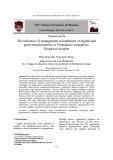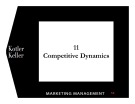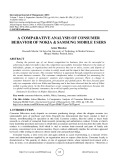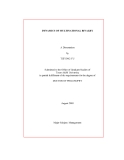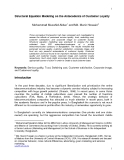
Competitive dynamics
-
This study explores the multifaceted impact of digital transformation and green initiatives on Vietnamese enterprises, explicitly focusing on the critical role of managerial commitment to information technology. Digital transformation, a catalyst for reshaping operations, strategies, and competitive dynamics, integrates digital technologies into various business aspects.
 11p
11p  viyuhi
viyuhi
 26-03-2025
26-03-2025
 2
2
 0
0
 Download
Download
-
From where is S brand growth coming? Determine the sources of volume due to: brand switching increased/decreased category consumption lost/new category buyers Did S Product Line contribute to overall category growth? What are the switching dynamics between “S” and other leading brands in the Category? With which competitive brands does “S” show the greatest interaction? What implications did volume switching and altered category consumption have on consumer purchase dynamics for “S”? What are the sources of volume for the other leading Category brands? Particularly Ke...
 122p
122p  ellisatran
ellisatran
 24-07-2013
24-07-2013
 128
128
 28
28
 Download
Download
-
Lecture "Marketing management - Chapter 11: Competitive dynamics" Expanding the total market, new ways to use a brand, market challenger strategies, general attack strategies, market follower strategies, niche specialist roles, maintaining a market advantage,... And other contents.
 29p
29p  bautroibinhyen11
bautroibinhyen11
 03-01-2017
03-01-2017
 49
49
 4
4
 Download
Download
-
The objectives of the study are therefore: (1) to apply the concept of the dynamic capability perspective to the IT–competitive advantage research in order to explicate the strategic role of IT in attaining competitive advantage; and (2) to examine the antecedent capabilities and competences that may lead towards developing adaptive IT capability.
 274p
274p  runthenight04
runthenight04
 02-02-2023
02-02-2023
 11
11
 3
3
 Download
Download
-
Consumer behavior is the study of individuals, groups, or organizations and the processes they use to select, secure, and dispose of products, services, experiences, or ideas to satisfy needs and the impacts that these processes have on the consumer and society.
 5p
5p  guineverehuynh
guineverehuynh
 22-06-2020
22-06-2020
 39
39
 0
0
 Download
Download
-
As more and more firms start to do business internationally, multinational rivalry1 has naturally emerged as a field of interest among researchers in different disciplines (Ghoshal, 1987). Consequently, a large body of work has explored topics such as market entry (Buckley & Casson, 1998; Davis, Desai, & Francis, 2000), foreign direct investment (FDI) (Graham, 1990; Knickerbocker, 1973) and technology diffusion (Gupta & Govindarajan, 2000; Kim & Kogut, 1996) of multinational enterprises (MNEs).
 206p
206p  mualan_mualan
mualan_mualan
 25-02-2013
25-02-2013
 65
65
 8
8
 Download
Download
-
In the past three decades, due to significant liberalization and privatization the entire telecommunications industry has become a dynamic service industry subject to increasing competition with huge growth potential. (Graack, 1996). In recent years, in some Asian countries the number of mobile subscribers even passed the number of fixed-line subscribers (Fink, Matto, & Rathindran, 2003). Hence, the strategic behavior of telecommunications companies has attracted so much attention in recent years, both in the academic literature and in the popular press.
 20p
20p  quanghao1991
quanghao1991
 26-08-2012
26-08-2012
 91
91
 9
9
 Download
Download
-
Explain the internal context of strategy. Identify a firm’s resources and capabilities and explain their role in its performance. Define dynamic capabilities and explain their role in both strategic change and a firm’s performance. Explain how value‑chain activities are related to firm performance and competitive advantage. Explain the role of managers with respect to resources, capabilities, and value‑chain activities.
 19p
19p  mikannatsume
mikannatsume
 27-03-2011
27-03-2011
 203
203
 14
14
 Download
Download
-
Understand what a strategy is and identify the difference between business-level and corporatelevel strategy. Recognize the difference between a fundamental and a dynamic competitive advantage. Describe the determinants of competitive advantage. Understand why we study strategic management.
 18p
18p  mikannatsume
mikannatsume
 27-03-2011
27-03-2011
 207
207
 25
25
 Download
Download
CHỦ ĐỀ BẠN MUỐN TÌM








